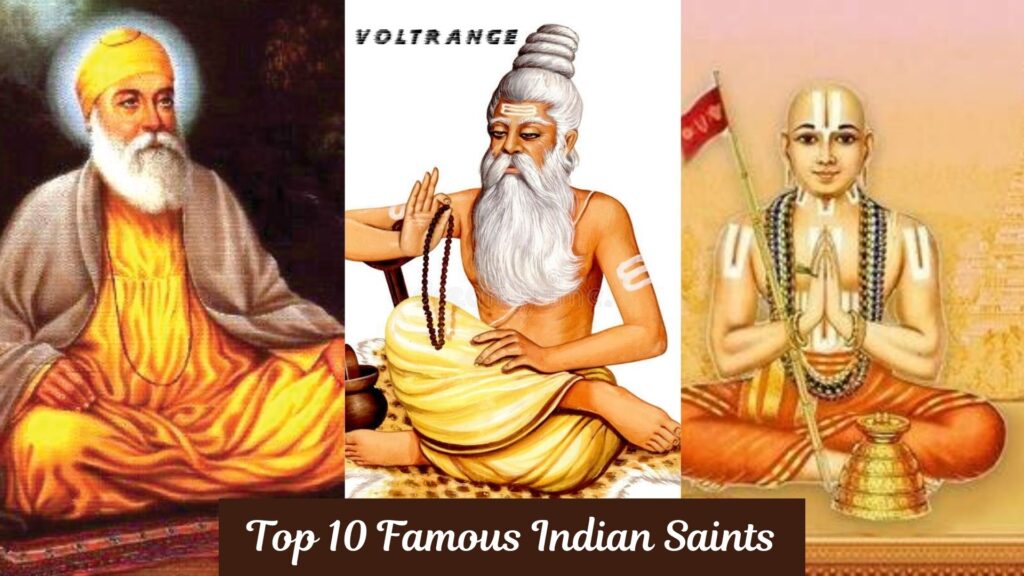
Top 10 Famous Indian Saints
India has long been a land of saints and spiritual leaders, whose teachings have profoundly influenced countless lives and guided people toward becoming better versions of themselves. Throughout history, many saints have emerged from different regions of the country, and their philosophies continue to resonate with people of all ages. Here’s a look at ten of the most famous Indian saints, whose timeless ideologies have left a lasting impact.
-
Ramanuja
Ramanuja, one of the earliest proponents of the Bhakti movement, is celebrated as a prominent disciple of his guru, Yamunamuni. He traveled extensively across India before finally settling in Srirangam, Tamil Nadu, where he established Vaishnavism on a strong foundation. Ramanuja is credited with founding the Visistadvaita Siddhanta and advocating a qualified form of monism. His teachings emphasize that the path to salvation lies in the principles of Karma (action), Bhakti (devotion), and Gyan (knowledge). He also authored significant works like the Gitabhashya and Sribhashya.
-
Chaitanya
Chaitanya, one of the foremost saints of the Bhakti movement, was born in Nawadwip, Bengal, and originally known as Vishwambhar Mishra. He played a crucial role in spreading Vaishnavism in Bengal, gaining fame for his devotional Kirtans. Chaitanya also founded a school of theology in Bengal and preached a religion centered on intense faith in Lord Hari. He was a devoted follower of Lord Krishna and Radha and sought to spiritualize life in the holy city of Vrindavan. After settling in Puri, where he spent his final years, his teachings were systematized by his followers in a work called the Chaitanya Charitamrita.
-
Shirdi Sai Baba
Shirdi Sai Baba was an Indian spiritual master revered by both Hindus and Muslims. His teachings emphasized self-realization and the futility of material attachment. He preached values such as forgiveness, love for others, inner peace, contentment, and devotion to God, and he condemned caste and religious discrimination. Sai Baba is considered by his devotees to be an incarnation of the Hindu deity Dattatreya.
-
Tulsidas
Tulsidas was a Vaishnava saint and poet who devoted his life to Lord Rama. He is best known for his works in Sanskrit, particularly the Hanuman Chalisa. Tulsidas spent most of his life in Varanasi and Ayodhya, where he founded the Sankat Mochan Hanuman Temple. He is also credited with creating the Ramlila plays, a folk theatre rendition of the Ramayana. Tulsidas is regarded as one of the greatest poets in Hindi literature, and his works have had a profound influence on Indian culture and society.
-
Surdas
Surdas, a 16th-century blind Hindu devotional poet, is renowned for his compositions in praise of Lord Krishna. His poems, written mainly in Braj and other medieval Hindi dialects like Awadhi, express deep devotion to Krishna. Surdas is closely associated with the Vallabha Sampradaya or Puṣṭimārga, and his works are integral to the ritual singing-worship practices of this sect.
-
Kabir
Kabir, born near Benaras, led a simple life as a householder. As a follower of Ramananda, he aimed to promote a religion of love that transcended caste and creed. Kabir emphasized the unity of God, whom he called by various names such as Rama, Hari, and Allah. He was a vocal critic of Hindu and Muslim rituals and practices, as well as the caste system, particularly the practice of untouchability. Kabir’s teachings, encapsulated in his dohas and sakhi poems, focus on personal spiritual growth under the guidance of a guru.
-
Ramakrishna Paramahansa
Shri Ramakrishna Paramahansa, born on February 18, 1836, in Kamarpukur, West Bengal, is revered as one of the greatest saints of the 19th century. A mystic and yogi, Ramakrishna worshipped the goddess Kali and believed himself to be a modern-day avatar of Lord Vishnu, although he never publicly proclaimed this. His teachings emphasize the importance of direct spiritual experience and the unity of all religions.
-
Guru Nanak
Sri Guru Nanak Dev Ji, the founder of Sikhism, is revered as the first Sikh Guru. Sikhism is a monotheistic religion with roots in both Hinduism and Islam. Guru Nanak’s teachings, preserved in devotional hymns, emphasize the liberation from the cycle of reincarnation through meditation on the divine name. He is especially venerated among Sikhs as the creator and greatest master of Punjabi devotional hymnody.
-
Guru Gobind Singh
Guru Gobind Singh, the tenth and last human Sikh Guru, was a warrior, poet, and philosopher. After the execution of his father, Guru Tegh Bahadur, by Emperor Aurangzeb, Guru Gobind Singh was installed as the leader of the Sikhs at the age of nine in 1675. His contributions to Sikhism include the establishment of the Khalsa, a Sikh warrior community, and the introduction of the Five Ks, articles of faith worn by Khalsa Sikhs.
-
Mahavira
Mahavira, the founder of Jainism and the 24th Tirthankara, was born into a royal Jain family in the early sixth century BCE. Renouncing worldly life at the age of 30, Mahavira pursued spiritual awakening through deep meditation and severe austerities, eventually achieving Kevala Jnana (omniscience). His teachings form the foundation of Jainism, which emphasizes non-violence, truth, and asceticism.
Conclusion
The Indian subcontinent has been home to many other saints who have contributed to its rich spiritual and cultural heritage. These saints, through their teachings on humanity and morality, have left an indelible mark on society, guiding people toward a more enlightened and compassionate way of life.





More Stories
which of the following statements is true about education and lifetime earnings? Complete Guide Here
Statekaidz.com: Education with Fun For Kids 2025
Top 5 Richest States in India by GDP